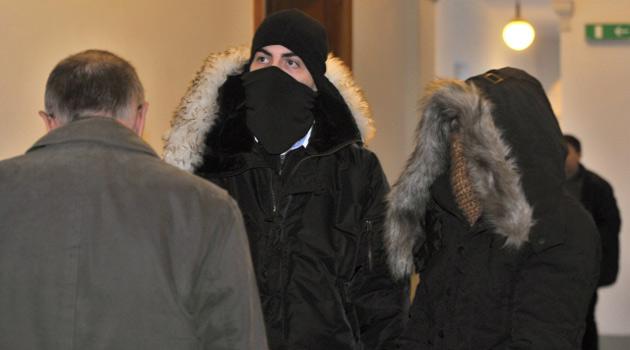Czech Police close investigation into arson attack by neo-Nazis on the Klinika Social Center

Prague Police have completed their investigation of the arson attack committed last year against the Klinika Social Center in the Žižkov quarter of Prague 3. The criminal case has been shelved because police failed to ascertain enough facts to begin felony prosecution of a specific suspect.
Czech Police spokesperson Tomáš Hulan provided the information in response to a query from the Czech News Agency. He said police primarily had a lack of evidence because it is not possible to prosecute an entire group of assailants in such cases, just individuals.
Hulan said the actions committed by one person involved have been assessed as a misdemeanor. According to the Klinika collective, the attack one year ago was eventually exploited by the authorities as a pretext not to extend the contract through which the state-owned building was being loaned for use by the group.
Klinika was then labeled a security risk. Since last March activists have remained on its premises illegally.
A group of masked neo-Nazis attacked the center last February at the close of a day of extensive anti-immigration demonstrations in Prague. Police investigated the incident as one of suspected rioting, reckless endangerment and property damage.
Czech Prime Minister Bohuslav Sobotka (Czech Social Democratic Party – ČSSD) announced after the incident that the Government anticipated an “independent and thorough” police investigation because it was important that the perpetrators be discovered. “Detectives did manage to identify the vast majority of ‘attackers’. It must be understood that overall they did everything they could to clarify this entire incident,” Hulan said.
The police spokesperson said one person has admitted to committing the attack. “However, his behavior can only be qualified as a misdemeanor, which we did after consulting with the state prosecutor,” Hulan explained, adding that officers have documented the case as misdemeanor disturbance of the peace and sent it to the appropriate authority that deals with misdemeanors.
“It is also necessary that the parties to this case describe the situation of any clues and mention the evidence found at the scene of the incident. Unfortunately, the resulting blaze not only degraded such clues and evidence, but the victims themselves also unprofessionally tampered with the clues and evidence, which is another basic fact that unequivocally harmed the investigation,” the police spokesperson added.
Klinka representatives reported after the incident that the building had been attacked by neo-Nazis with flares and rocks, setting part of the cafe on fire. More than 20 people were in the building at the time.
One person reportedly suffered head injuries and several reportedly suffered smoke inhalation as a consequence of the attack. “After the attack we noticed that the public was strongly in support of us, including even some top politicians. For the bureaucrats…, however, the attack was, paradoxically, a reason to label Klinika asecurity risk and to not extend our contract. Despite all of the offense taken by politicians over the attack, the position of official institutions has been clearly expressed: It pays to commit neo-Nazi violence. The contract for Klinika was cancelled and nothing has happened to the attackers,” Klinika posted to its Facebook page on the anniversary of the attack.
Radek Ležatka, spokesperson for the Office for Government Representation in Property Affairs (Úřad pro zastupování státu ve věcech majetkových – ÚZSVM) has strongly objected to those allegations. “The arson attack on the building was under no circumstances our reason for canceling the contract… That information is false. We unequivocally condemned that attack as we condemn all other violence,” he told the Czech News Agency.
Neo-Nazi fans of Bohemians, Slavia and Sparta were the attackers
News server Aktuálně.cz has reconstructed in detail how the attack was committed by radical footbal fans. The rowdies were connected to each other by their hatred of refugees and some are members of the extreme right.
One fan involved had a tattoo of the symbol of the neo-Nazi band Skrewdriver. It has been demonstrated that fans of Slavia and Sparta (who are otherwise mutual enemies) joined forces to attack Klinika, which had been collecting clothing for refugees.
Bohemians fans were present during the arson attack as well. “I understood from what I heard that it was going to be a football battle with the Slavia guys,” Aktuálně.cz reported one of the attackers telling police.
At the tram stop outside of the Viktoria Žižkov stadium a group of about 20 Slavia and Sparta fans got on a tram that day heading for the Parukářka Park in the neighborhood of Klinika. Football hooligans had already assaulted a march in support of refugees on Thunovská Street in Prague earlier that day, so police knew extremists were travelling around the city.
At Parukářka the hooligans were joined by a group of 15 people wearing white balaclavas. They led the attack.
The attackers were armed with flares, rocks and sticks. “People around me started picking up rocks, somebody came up and gave me one,” a participant in the attack named Martin, who is into martial arts, told the police, according to Aktuálně.cz.
“Part of the group ran toward Klinika and threw rocks at the building, somebody threw flares and a curtain caught fire. I ran away. I was afraid I would get into trouble,” David, a Bohemians fan, was quoted as saying by Aktuálně.cz.
